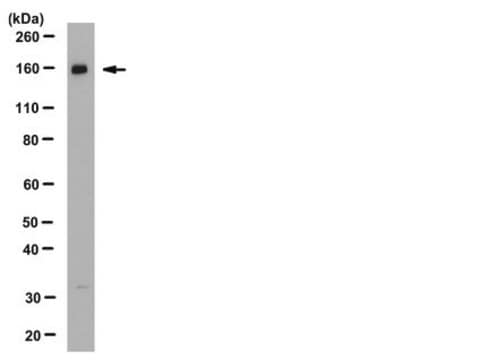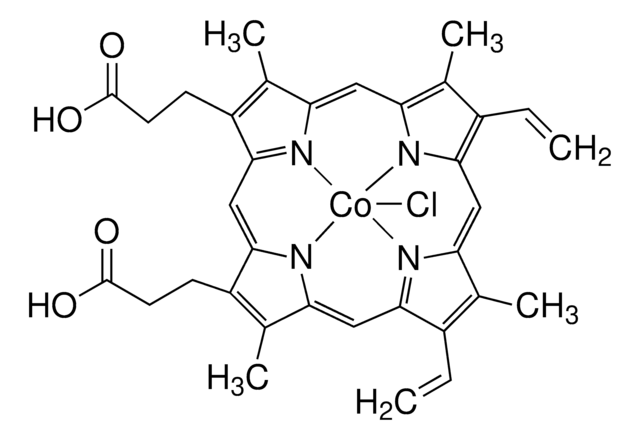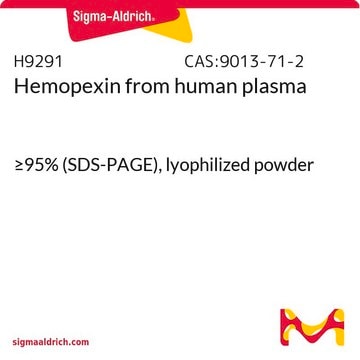MAK316
Heme Assay Kit
sufficient for 250 colorimetric tests
Synonym(s):
Heme Quantification Kit
Sign Into View Organizational & Contract Pricing
All Photos(1)
About This Item
UNSPSC Code:
12161503
NACRES:
NA.84
Recommended Products
detection method
colorimetric
relevant disease(s)
hematological disorder
storage temp.
2-8°C
General description
Heme is a member of the porphyrin family. It is synthesized in both mitochondria and cytoplasm, and is a key prosthetic group for various essential proteins such as hemoglobin, cytochromes, catalases and peroxidases. Free heme, which can be released from hemoglobin following hemolysis, is pro-inflammatory and contributes to iron-derived reactive oxygen species. Heme determination is widely practiced by researchers of various blood diseases.
Features and Benefits
Compatible with high-throughput handling systems.
Suitability
Suitable for the quantitative determination of heme and evaluation of drug effects on heme metabolism in a variety of biological samples such as blood, plasma, serum, urine, and heme carrying enzymes.
Principle
Heme assay is based on an aqueous alkaline solution method, in which the heme is converted into a uniform colored form, producing a colorimetric (400 nm) result, directly proportional to the heme concentration in the sample. The optimized formulation reduces interference and exhibits high sensitivity. One mg/dL heme equals 15.3M, 0.001%, or 10ppm. The kit has a linear detection range of 0.6–125M heme in a 96 well format.
Signal Word
Warning
Hazard Statements
Precautionary Statements
Hazard Classifications
Aquatic Acute 1 - Aquatic Chronic 2 - Eye Irrit. 2 - Met. Corr. 1
Storage Class Code
8B - Non-combustible corrosive hazardous materials
Flash Point(F)
Not applicable
Flash Point(C)
Not applicable
Certificates of Analysis (COA)
Search for Certificates of Analysis (COA) by entering the products Lot/Batch Number. Lot and Batch Numbers can be found on a product’s label following the words ‘Lot’ or ‘Batch’.
Already Own This Product?
Find documentation for the products that you have recently purchased in the Document Library.
Customers Also Viewed
Brell Jennifer et al.
Communications biology, 3(1), 621-621 (2020-10-29)
Iron is essential for living cells. Uptake of iron-loaded transferrin by the transferrin receptor 1 (CD71, TFR) is a major but not sufficient mechanism and an alternative iron-loaded ligand for CD71 has been assumed. Here, we demonstrate that CD71 utilizes
Dietmar Hammerschmid et al.
Computational and structural biotechnology journal, 19, 1874-1888 (2021-05-18)
Globin-coupled sensors (GCS) usually consist of three domains: a sensor/globin, a linker, and a transmitter domain. The globin domain (GD), activated by ligand binding and/or redox change, induces an intramolecular signal transduction resulting in a response of the transmitter domain.
Role of heme and heme-proteins in trypanosomatid essential metabolic pathways.
Tripodi K E, et al.
Enzyme Research, 2011 (2011)
Yu-Yin Liu et al.
Reproduction (Cambridge, England), 158(3), 257-266 (2019-07-13)
Endometriosis (EMS) is a chronic inflammatory disease characterized by the presence of extrauterine endometrial tissues. It has been previously reported that the refluxed blood containing viable endometrial tissues and the defective elimination of peritoneal macrophages in the pelvic cavity may
Hemopexin therapy reverts heme-induced proinflammatory phenotypic switching of macrophages in a mouse model of sickle cell disease.
Vinchi F, et al.
Blood, 127(4), 473-486 (2016)
Our team of scientists has experience in all areas of research including Life Science, Material Science, Chemical Synthesis, Chromatography, Analytical and many others.
Contact Technical Service











